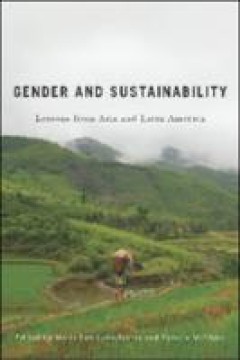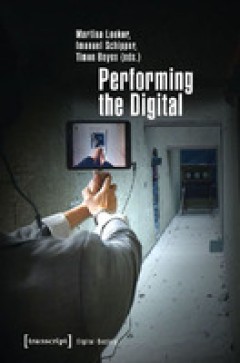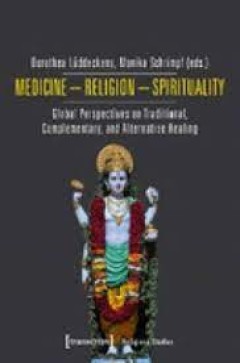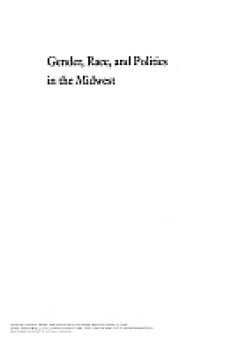Filter by

Gender and Sustainability: Lessons from Asia and Latin America
This is one of the first books to address how gender plays a role in helping to achieve the sustainable use of natural resources. The contributions collected here deal with the struggles of women and men to negotiate such forces as global environmental change, economic development pressures, discrimination and stereotyping about the roles of women and men, and diminishing access to natural reso…
- Edition
- Ed. 1
- ISBN/ISSN
- 9780816548439
- Collation
- -
- Series Title
- -
- Call Number
- 307 GEN g

Paradoxes of Interactivity: Perspectives for Media Theory, Human-Computer Int…
Current findings from anthropology, genetics, prehistory, cognitive and neuroscience indicate that human nature is grounded in a co-evolution of tool use, symbolic communication, social interaction and cultural transmission. Digital information technology has recently entered as a new tool in this co-evolution, and will probably have the strongest impact on shaping the human mind in the near fu…
- Edition
- Ed. 1
- ISBN/ISSN
- 9783899428421
- Collation
- 344
- Series Title
- Kultur- und Medientheorie
- Call Number
- 371.3 PAR p

Assessing Social Impact of Social Enterprises: Does One Size Really Fit All?
This book explores the diversity of Social Impact Assessment (SIA) models and outlines a self-assessment on models to support social entrepreneurs. The chapters trace the concept and origins of social entrepreneurship and elicits current implementation of SIA models by social enterprises. The comprehensive review of over seventy five SIA models will be especially useful for social entrepreneurs…
- Edition
- Ed. 1
- ISBN/ISSN
- 978-3-319-15314-8
- Collation
- X, 111
- Series Title
- SpringerBriefs in Business
- Call Number
- 658.421 GRI a

Performing the Digital
How is performativity shaped by digital media – and how do performance practices themselves reflect and alter techno-social configurations? Performing the Digital inquires into the technological terms and conditions of performance and performance studies, and maps and theorizes the registers of performance at work in digital cultures. The contributions range from the performativity of algorit…
- Edition
- -
- ISBN/ISSN
- 9783839433553
- Collation
- -
- Series Title
- -
- Call Number
- -

Medicine – Religion – Spirituality Global Perspectives on Traditional, C…
In modern societies the functional differentiation of medicine and religion is the predominant paradigm. Contemporary therapeutic practices and concepts in healing systems, such as Transpersonal Psychology, Ayurveda, as well as Buddhist and Anthroposophic medicine, however, are shaped by medical as well as religious or spiritual elements. This book investigates configurations of the entanglemen…
- Edition
- -
- ISBN/ISSN
- 9783837645828
- Collation
- -
- Series Title
- -
- Call Number
- -

Our Neighbours, Ourselves Contemporary Reflections on Survival
Homi K. Bhabha delivered the 2010 Hegel lecture, evoking the spirit of Hegel in an attempt to understand contemporary issues of ethical witness, historical memory and the rights and representations of minorities in the cultural sphere. Who is our neighbour today? What does hospitality mean for our times? Why is the recognition of others such an agonizing encounter with the alterity of the self?…
- Edition
- -
- ISBN/ISSN
- 9783110262445
- Collation
- -
- Series Title
- -
- Call Number
- -

The Orientalist Semiotics of Dune
Frank Herbert’s »Dune« (1965) is considered to be one of the most successful Science Fiction novels of the 20th century. It introduces its readers to a future universe, in which the production of the most valuable resource of the universe – ›spice‹ – is only possible on one vast desert planet called Arrakis. »Dune« offers many different motifs, including a hero that eventually tur…
- Edition
- -
- ISBN/ISSN
- 9783963178511
- Collation
- -
- Series Title
- -
- Call Number
- -

Artistic Research and Literature
What is practice-based literary research? While literature as a discipline is currently not represented in the artistic research discourse, individual writers and scholars have ties to a variety of institutional constellations in which overlaps between literature, art, and research become manifest. 16 of them expand on their methodological approaches as well as their practice, and they analyse …
- Edition
- -
- ISBN/ISSN
- -
- Collation
- -
- Series Title
- -
- Call Number
- -

Gender, Race, and Politics in the Midwest
During the thirty year period from 1890 to 1920, the African American club women in Illinois helped establish the largest national network of black club women in the country, The National Association of Colored Women, created hundreds of female associations, organized the only federation of its kind in the state, The Illinois Federation of Colored Women, and cast ballots for the first black ele…
- Edition
- -
- ISBN/ISSN
- 9780253069030
- Collation
- -
- Series Title
- -
- Call Number
- -

Invited Lectures from the 13th International Congress on Mathematical Education
Mathematics Education; Mathematics Learning; Mathematics Teaching; Mathematics Teachers; ICME-13; 13th Congress on Mathematical Education; Empirical Studies in Mathematics Education; Theoretical Reflections on Mathematics Education; Tertiary Mathematics Education; Secondary Mathematics Education; Primary Mathematics Education; Society of Didactics of Mathematics; Mathematics Educators; Improvem…
- Edition
- -
- ISBN/ISSN
- 9783319721705
- Collation
- -
- Series Title
- -
- Call Number
- -
 Computer Science, Information & General Works
Computer Science, Information & General Works  Philosophy & Psychology
Philosophy & Psychology  Religion
Religion  Social Sciences
Social Sciences  Language
Language  Pure Science
Pure Science  Applied Sciences
Applied Sciences  Art & Recreation
Art & Recreation  Literature
Literature  History & Geography
History & Geography